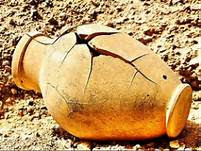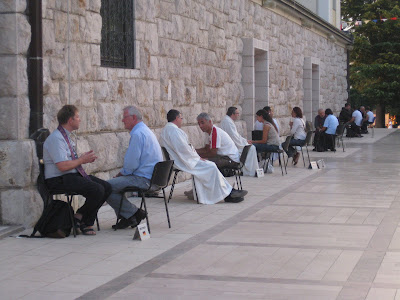Perhaps one of the strangest things that Jesus did before he ascended to heaven at the end of his earthly life, was to entrust his Church to priests: ordinary, sinful, weak human beings. This is something that we do not understand, but we believe. Through the gift of the priesthood He gave us the most extraordinary gift of all, the gift of the Eucharist, which is the gift of Jesus himself, really and truly present in the form of bread and wine. There is no gift greater than this, but the fact that he made it depend on priests is what is so strange.
I am sure that one reason in particular why he did this was to make it obvious that it is God who is at work and that the Lord is in no way dependent on the gifts or skills of human beings alone, especially not us priests. Whenever I get together with other priests, it often strikes me what a strange collection of people we are, from all kinds of backgrounds. We used to joke in the seminary that it always seemed to be the holiest men who left.
There is a great story in the Old Testament which explains this; it is the story of Gideon. Gideon and his people were being wiped out by the Amorites and it was a time of great suffering for them. Then one day the angel of the Lord appears to this man Gideon and says, ‘Hail valiant warrior. The Lord is with you.’ In reply Gideon says, ‘If God is with us, why are we being wiped out?’ A fair question! The angel goes on to tell Gideon that God has specially chosen him to lead his people to freedom from their enemies. But then Gideon asks an interesting question. He says, ‘Why would God pick me, since I am the weakest member of my family and my family is the least important family in my tribe?’ In other words, why would God pick the weakest of the weak to lead his people to freedom? It doesn’t make any sense by our way of thinking, but the angel convinces him that God has chosen him and he will be alright.
Gideon is then told to raise an army and so he gets together 30,000 men, but then to his astonishment God tells him to reduce the number of men to only 300 and he tells him why, and this is the crucial bit: ‘Lest the people think that it is by their own strength that they have won victory over their enemies.’ God chooses the weakest man around, with only a handful of men to conquer the enemy, so that it will be totally obvious that it was the power of God that made this happen.
If Gideon had been a great warrior and he conquered his enemies with a huge army, then no one would be surprised. But when the most unexpected person leads a handful of men and conquers a huge army, then everyone says ‘Look what God did! What a miracle!’
I believe that God picked various men to be priests for the same reason, so that it would be obvious that it is God who is at work. So He chooses ordinary, weak men, to make it all the more obvious that the Church is still here because of him and not because of priests.
St. Paul speaks about this in one of his letters. He writes, ‘We are only the earthenware jars that hold this treasure, to make it clear that such an overwhelming power comes from God and not from us’ (2 Cor 4:7). God uses ordinary cracked pots (‘cracked-pots’) to carry his message, to make it obvious that it is his power at work.
When the priest says the words of consecration at each mass the Holy Spirit immediately and humbly obeys the priest and changes the bread and wine into the Body and Blood of Jesus. God obeys a human being! I don’t understand it, but I believe it. And when the priest says 'I absolve you from your sins, in the name of the Father and of the Son and of the Holy Spirit,' the Holy Spirit immediately wipes away those sins. God is so humble that He will act on the words of a human being.
What if the priest is not a very good or holy man? Is God any less present in the mass if it is not a holy priest? Of course not. God would never allow his power to depend on the goodness of a human being, because none of us are good enough or holy enough. Even if the priest is a terrible sinner, God is just as powerfully present in the mass, in confession, and wherever He calls the priest to work. It is a great help for our faith if the priest is a holy man, but either way God is just as much present, because God gives himself completely to all of us in this extraordinary way, through the priesthood and it doesn’t depend on the priest being good enough and thank God for that!
I think one of the greatest proofs that the Church is from God is simply the fact that it is still here, in spite of the fact that there have been centuries of bad example, bad preaching, scandals, etc, and yet it is still here. Think of all the great empires and dynasties that have come and gone and they were much better organised and impressive, but they are gone, and yet the Church is still here.
Why don’t we have women priests? We believe that Jesus established a male priesthood with the Apostles on Holy Thursday, at the last supper. Any teachings we believe are from God, we cannot change. If it was a man-made decision it could be changed, but we believe this is from God. It is a question of different roles within the Church. Different people are called to different roles, just like men cannot become Poor Clare nuns. Some people disagree with it, but that is the understanding behind it.
Why can’t priests be married? At some stage priests began to live celibate lives and eventually it became the rule. It is a rule that could be changed, because it is a man-made decision. Sometimes, celibacy is blamed for sexual abuse in the Church, but that is not true, as a far higher percentage of abuse happens by married men. What might surprise you is that most of the people who will argue for celibacy, are priests. It is just like monks or nuns, who dedicate their whole life to serving God in this way.
Finally, if you find yourself becoming disheartened by the bad example of priests, or indeed anyone in the Church, remember these words of Jesus:
‘The priests occupy the chair of Moses, so you must listen to what they say but do not be guided by what they do, since they do not practice what they preach.’ (Matt 22:2-3)
In other words, we must try and listen to the teaching of Jesus passed on through the Church and through his priests, but don’t be put off when they don’t always live the way they should. What is important is the teaching of Christ and not the example of the priest. The teaching of Jesus is what we hold on to.
I have to confess that it always scares me a little when God warns his priests about the responsibility we have been given. The Scriptures are also full of very stern warnings to the priests to live as they should and not abuse their position. We will be accountable as God’s priests. It is a great gift, but it is also a great responsibility.
We are only the earthenware jars that hold this treasure, to make it clear that such an overwhelming power comes from God and not from us (2 Cor 4:7).

















